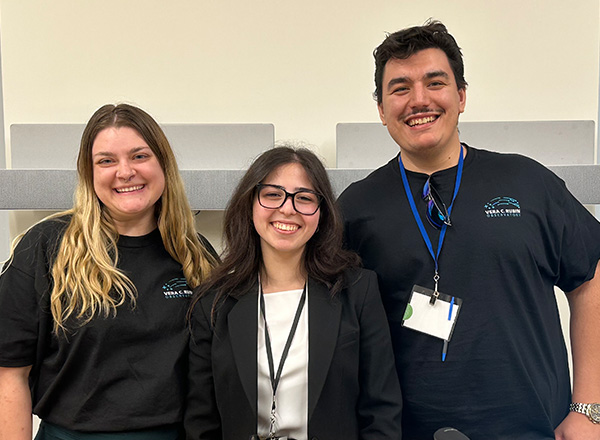Astronomy students connect to national researchers and cutting-edge technology

In late July, HFC students Mariam “Marie” Fawaz, Cortney Rinehart, and recent HFC alumnus Anthony Preston – all members of the student research group called the Dead Stars Society (DSS) – attended the Rubin Community Workshop 2024, a week-long research conference in Menlo Park, CA, sponsored by the Vera C. Rubin Observatory.
“This experience reinforced the value of our contributions and the importance of continuing to advocate for greater inclusion in the field of astronomy,” said Rinehart.
The conference brought together researchers from scientific communities around the world. Astrophysicists, professors, graduate students, undergraduate students, and Discovery Alliance employees contributed their unique perspectives to the discussions, presentations, and breakout sessions. HFC was only one of two community colleges present.
Fawaz presented at the conference, which was a valuable platform for sharing ideas and fostering collaborations that could enhance research opportunities for underrepresented students. It provided a unique opportunity to network with faculty and students.
“The three of us were graciously sponsored and invited to attend the conference to propose our research and advocate for better research opportunities for underrepresented students, especially those from community colleges. The atmosphere was welcoming, with attendees showing genuine interest in the presentations and proposals,” said Rinehart. “Our team stood out at the conference because there were only two community colleges. This distinction provided us with a unique platform to discuss expanding research opportunities for undergraduates.”
Impassioned advocacy for underrepresented students
Fawaz, who is writing a manual on astrophysics research to make it easier for students to understand, spoke about how underrepresented undergraduate students are in terms of resources and support when studying astrophysics.
“The biggest challenge I faced was the anxiety about presenting in front of a big crowd,” said Fawaz. “It was more unnerving to imagine that my audience included renowned scientists and people affiliated with the LSST Discovery Alliance because I wanted everything to go perfectly.
“Aside from practicing my presentation skills, I was aware that I am ultimately trying to do something that will benefit the scientific community, and that is exciting. I was able to give my presentation with genuine passion. I was able to further unwind afterward because the audience provided helpful feedback.”
She continued: “Everyone I networked with showed the utmost kindness and respect toward our efforts (at HFC). People expressed their admiration for our work and were intrigued to learn more about the tools we’ve been developing to maximize community impact and increase involvement of more underrepresented students. I realized how much we’ve managed to accomplish as a team; I take great pride in being a part of that.”
Research is about giving back
Hearing Fawaz’s presentation made Rinehart proud of her fellow student.
“During Marie's presentation on the importance of providing more research opportunities for community college students, many researchers, professors, astrophysicists, and LSST-DA employees were nodding in agreement,” said Rinehart. “They also vocalized their agreement and offered to collaborate with DSS to extend research opportunities to two-year college students. It was gratifying to see how the work we have done within DSS and the presentations we have given reach this point where Ph.D.s and astrophysicists were eager to extend their assistance.”
For Fawaz, it was gratifying to see a presentation directed toward engaging undergraduate students in research.
“I feel like it can be challenging to feel ‘seen’ as an undergraduate student, especially when you’re surrounded by people with so much experience and in-depth knowledge,” she said. “The experience helped my love of science grow even more, because there are scientists who truly care about diversifying the scientific community. This experience changed my perspective on research. It is about giving back to the community and being a part of something bigger.”
Validation of their accomplishments
Dr. Dan Peluso of the LSST-DA showed the three his advanced telescope, the Unistellar eVscope 2.
“It was incredible to see galaxies, nebulae, and distant stars in such great detail through an advanced telescope, and even more exciting to be able to connect my phone to this telescope to save the gorgeous photos of what we were witnessing!” explained Rinehart. “I have never thought that I could look through a telescope and be as amazed by what I saw. By having this opportunity to use the Unistellar, I’m excited for future research opportunities!”
Preston realized one of the people Peluso was talking about was HFC physics and astronomy instructor Jesse Mason.
“Dan ended up giving me his contact information so Jesse could reach out and potentially get this insanely cool telescope for the College! What makes the telescope so cool is that it is entirely electronic, can be used in poor lighting, allows for multiple people to connect to it at the same time and download the image of what the telescope sees, and many other super cool features,” explained Preston.
Mason has already signed up for the Unistellar College Astronomy Network free telescope program.
"I could not be prouder of Marie, Cortney, and Anthony,” said Mason. “The three of them founded our research team and have played essential roles in all our successes. Working with them has been the highlight of my career."